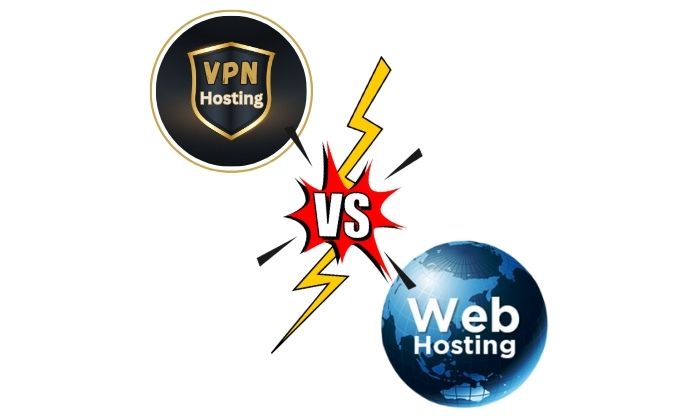VPN Hosting vs Regular Hosting: Key Differences Explained
In today’s digital landscape, web hosting is essential for making websites accessible online. It provides the servers and infrastructure that support websites, blogs, and online stores. As ZAG Interactive notes, where and how your site is hosted is a “vital foundation” for securityzaginteractive.com. In recent years, VPN hosting has emerged as a privacy-focused alternative. VPN hosting combines traditional hosting with a Virtual Private Network, encrypting traffic and hiding IP addresses to boost security and anonymity. In this article, we compare VPN hosting vs regular hosting (shared/VPS/dedicated) to help you choose the right solution for your needs.

What is VPN Hosting?
VPN hosting is a hosting service where the server is configured to run VPN software alongside or as part of the hosting environment. In other words, it combines web hosting with VPN protection. WebsiteHosting.com explains that VPN Web Hosting “combines the security and privacy features of a VPN with the hosting capabilities of a traditional web hosting service”. In practice, VPN hosting means all data passing between your website (or users) and the server is routed through an encrypted VPN tunnel. As one provider describes it, VPN hosting allows you to “securely encrypt and tunnel your internet traffic” through the server.
This setup serves several use cases. It enhances privacy by masking the user’s IP address and encrypting traffic, making it ideal for sites handling sensitive data (e.g. financial or healthcare sites). It also allows bypassing geo-restrictions: a server in one country can make content available to users as if they were in another. Importantly, VPN hosting can support personal or private VPN servers. For example, Hostinger notes that you can deploy an OpenVPN server on your VPS: “we have a pre-made template… [that] will automatically install… OpenVPN”. This means you could use VPN hosting to set up your own secure, private network for remote access or P2P sharing. Overall, VPN hosting is chosen by those who prioritize privacy, secure remote access, or unrestricted content access – essentially blending hosting with a private VPN service.
What is Regular Hosting?
Regular hosting (also called traditional or web hosting) refers to standard hosting plans for websites. This includes shared hosting (many sites on one server), VPS (Virtual Private Server) hosting (a virtual machine with dedicated resources on a shared physical server), and dedicated hosting (an entire server for one user). The purpose is straightforward: to store website files and serve them to visitors. For example, Bluehost explains that web hosting is simply “a service that allows individuals and businesses to make their websites accessible on the internet,” and notes that popular users include bloggers, small businesses, WordPress users, and eCommerce sites.
In regular hosting, each site’s data is stored directly on the provider’s server. In shared hosting, dozens or hundreds of websites share one physical server – “if one website experiences a surge in traffic, it can impact the performance of other websites on the same server”. VPS plans carve out a section of a server for you, providing fixed CPU/RAM. Dedicated hosting gives you an entire machine with full resources. Regular hosting is commonly used for blogs, portfolios, small business sites, online stores, and any project that needs an online presence but doesn’t specifically require built-in privacy features.
Key Differences Between VPN Hosting and Regular Hosting
To compare VPN hosting and regular (traditional) hosting, consider these key factors:
|
Factor |
VPN Hosting |
Regular Hosting |
|
Privacy & Security |
High: Encrypts all traffic and masks IP address. Each site runs in an isolated VPN server, reducing cross-site risk. |
Standard: No built-in VPN encryption (only SSL if used). On shared plans, if one site is compromised it can affect others. |
|
Performance |
Good (dedicated resources), but encryption/routing can add some latency. |
Varies: Shared can slow down with high traffic. VPS/dedicated plans offer stable speed (no VPN overhead). |
|
Cost |
Generally higher. Specialized plans often start ~$20–$30+/mo. |
Lower. Shared plans often cost around $6–$20/mo. VPS/Dedicated vary widely ($5–$50+ or more). |
|
Ease of Setup |
More complex. You may need to install/configure VPN software. VPS solutions give full control (Hostinger notes setup “may require some expertise”). |
Easy. Shared hosting is plug-and-play with managed setup (“Host manages all technical aspects”). Control panels simplify tasks. |
|
Target Users |
Privacy-conscious users, companies with remote teams, or anyone needing encrypted access. |
General users: bloggers, small businesses, e-commerce, portfolio sites. (Bluehost’s audience: “bloggers, small businesses… eCommerce… store owners”.) |
|
Geo-Restricted Content |
Excellent. Can appear from any server location to bypass blocks. |
Poor. Traffic comes from the server’s fixed location; cannot bypass geo-blocks for end users. |
|
Streaming/Torrenting |
Supported. VPN use enables anonymous streaming and torrenting (traffic is encrypted, location-hidden). |
Not supported by host. Regular hosting is for serving websites and typically disallows torrenting or P2P. |
|
Scalability |
Moderate. Many providers offer upgrade paths, but some have fixed plans. Cloud/VPS-based VPN hosts can scale by upgrading the VM. |
High. Cloud and VPS plans can easily scale resources. Dedicated servers can be upgraded or clustered for growth. |
VPN Hosting vs Regular Hosting: Privacy & Security
One of the biggest differences lies in privacy and security. VPN hosting encrypts all data and hides the user’s real IP, giving a strong privacy layer. In a VPN host each site lives on its own private server (sometimes a VPN tunnel), so sites do not share environments. As a hosting guide explains, this “isolation reduces the risk of one website affecting the others, providing enhanced security for sensitive data”. In contrast, traditional hosting does not include VPN encryption by default. On a shared host, traffic is not automatically tunneled, and if one site is hacked, others on that server can be at risk. As ZAG Interactive emphasizes, hosting location and security are “a vital foundation” for any sitezaginteractive.com. In summary, VPN hosting offers built-in privacy (encryption and anonymity), whereas regular hosting treats security as optional (via SSL) and exposes server IPs openly.
VPN Hosting vs Regular Hosting: Performance
Performance can swing either way. VPN hosting typically provides each website with dedicated resources, meaning a busy site won’t slow down its neighbors. This often leads to faster loading times for high-traffic sites, as noted in a comparison: “VPN web hosting provides dedicated resources, guaranteeing faster speeds”. However, VPN encryption and the extra routing can introduce latency. On the other hand, regular hosting performance depends on the plan. Cheap shared hosting can suffer if one website surges in traffic. By contrast, VPS or dedicated plans (even without VPN) offer stable, high performance because they give you your own resources – and without the overhead of encrypting every packet. In practice, a simple static site on a shared host might load a bit faster than on a VPN setup, but VPN hosting excels under heavy load and provides consistent throughput thanks to its isolation. The table above and cited sources confirm that VPN hosts tend to handle resource-heavy traffic better, while shared hosting can degrade performance under stress.
Pros and Cons of VPN Hosting
Pros:
VPN hosting’s main advantage is privacy and security. Traffic is encrypted end-to-end, so sensitive data (passwords, user info, financial details, etc.) are kept confidential. VPN hosting also improves privacy because “your IP address is masked and online activities are encrypted,” preventing tracking by ISPs or other parties. Additionally, it often comes with built-in DDoS protection and firewalls. Performance can even improve for high-demand sites because each site has dedicated resources. Crucially, VPN hosting enables bypassing regional restrictions: users “can bypass geographical restrictions and access blocked or unavailable content in their region”. In practice, that means streaming shows or accessing news as if you were in a different country is straightforward. For companies, remote teams benefit greatly; VPN hosting “provides a secure communication mechanism” that safeguards workflows. Overall, VPN hosting shines when privacy, security and uncensored access are must-haves.
Cons:
VPN hosting tends to be more expensive than basic hosting. For instance, a specialized VPN hosting plan might cost $30+/month, whereas a simple shared site could be under $10. It also requires more technical setup: many VPN hosts expect you to install VPN software yourself, so “basic server management experience is recommended”. Some hosts supply setup guides (e.g. Hostinger’s OpenVPN template), but it’s still more involved than a one-click website install. Another drawback is location coverage. VPN hosts often have limited server locations, so if you need a specific country, you must check availability. Bandwidth can be capped as well; many VPN plans impose strict data limits which can throttle large file transfers. The extra encryption can also slow down speeds somewhat compared to raw hosting. Finally, some common website software or ports might not be supported under a VPN setup. In summary, while VPN hosting is powerful for privacy, its downsides are higher cost, extra setup effort and potential speed/bandwidth limits.
Pros and Cons of Regular Hosting
Pros:
Traditional hosting is generally affordable and easy to use. Shared hosting is the cheapest option: plans often start around $6–$20 per month and include essentials like server management and support. The provider handles maintenance and glitches, so “host manages all technical site aspects,” meaning you get 24/7 support and don’t need sysadmin skills. User-friendly control panels (cPanel, website builders) make it easy for beginners. Scaling is straightforward too – you can upgrade your plan as your site grows. Essentially, regular hosting covers all the basics for running blogs, portfolios, small business sites or eCommerce on a budget.
Cons:
The trade-off is limited privacy and security by default. On a shared server, one site’s breach can compromise others, as Verpex notes: “shared servers risk all sites if one is attacked”. Performance can suffer during traffic spikes from neighboring sites. Regular hosting also ties you to physical server locations, so you can’t easily appear from a different country. There’s no inherent IP masking or VPN tunnel, so your browsing and data are not anonymized. In summary, regular hosting works well for standard, low-risk sites, but it offers less protection. If strong privacy or uncensored access is needed, it’s a weaker choice compared to VPN hosting.
Which One Should You Choose?
For most everyday websites, regular hosting is the practical choice. It is cheap, user-friendly, and sufficient for blogs, small business sites, and standard e-commerce. As one comparison explains, shared (regular) hosting is “cost-effective for smaller websites with lower security and performance requirements”. If you’re running a personal blog or local store site on a budget, regular hosting (with SSL) is usually enough.
In contrast, VPN hosting is best when security and privacy trump cost. If your website handles sensitive user data, financial information, or if you and your team often work remotely (perhaps across different countries), VPN hosting’s encrypted tunnels make sense. It’s also ideal for those needing to access or stream region-locked content. For example, a content creator who travels abroad might use VPN hosting to reliably access home-country services. Businesses with remote teams may prefer VPN hosting to secure their internal network. As a guide notes, VPN hosting offers “increased security, better performance, and scalability, [making it] suitable for websites that handle sensitive data or experience high traffic”.
In short: Choose VPN hosting for privacy and security; choose regular hosting for simplicity and affordability. Assess your needs (and budget) carefully. If you don’t require anonymity, a regular shared or VPS plan is cost-effective. If anonymity, encryption or geo-spoofing are critical, VPN hosting wins despite higher fees.
Best VPN Hosting Providers (for Reference)
-
EmpireVPS – Offers dedicated VPN hosting servers (e.g. in Iran) designed for privacy. Their plans start around $29.99/month for a VPN-optimized VPS.
-
Empower Servers (NordVPN-powered) – Resells NordVPN business plans. They have a VPN hosting plan starting at $8.99/month with NordVPN’s global network.
-
NavicoSoft – Specializes in managed VPN server hosting with DDoS protection. (They advertise “cost-effective” plans for remote access, though details vary.)
-
Hostinger (VPS with OpenVPN) – While not a dedicated VPN host, Hostinger allows you to launch a VPS and easily install OpenVPN via their template. This can serve as a private VPN server using Hostinger’s infrastructure.
-
Kamatera / DigitalOcean / Vultr (Cloud VPS) – Not VPN-specific, but popular cloud VPS providers where you can self-deploy any VPN software (OpenVPN, WireGuard, etc.) on flexible hardware. These offer global data centers and pay-as-you-go pricing.
(Note: The above are examples of providers known to support VPN server setups or privacy-focused hosting. Plans and features may change, so check the current offerings for details.)
Conclusion
VPN hosting and regular hosting serve different priorities. VPN hosting stands out for security and privacy: traffic is encrypted and origins hidden (no one can easily spy on your site or its users). It even enables bypassing censorship and region locks. Regular hosting, on the other hand, is about cost and convenience: it gets your site online cheaply and with minimal setup. As one source summarizes, shared (regular) hosting is more affordable for smaller sites, whereas VPN hosting provides that “increased security” needed for sensitive applications. Your choice should hinge on your needs. If your focus is a simple website or blog, a traditional host is usually fine. If you handle private data, require anonymity, or need unrestricted access from any location, then a VPN-enabled hosting solution is worth the extra expense.
References and Sources:
- ZAG Interactive – Why Website Hosting and Security is Vital
- EmpireVPS – Secure Iran VPN Hosting
- WebsiteHosting.com – Comparing VPN Web Hosting to Other Hosting Types
- Verpex – Pros and Cons of Shared Hosting
- Bluehost – Web hosting FAQ
- NavicoSoft – VPN Server Hosting | Managed Open VPN
- Hostinger – Is VPN Available at Hostinger?
- EmpowerServers – VPN Hosting
Suggestions for you
How to Activate eSIM on Pixel 3 and Pixel 3a (Step-by-Step Guide)
459 Views

Top Free VPN Detection Tools Online
141 Views

How to Activate eSIM on iPhone 11, iPhone 11 Pro and iPhone 11 Pro Max
421 Views

Telstra International Roaming Charges, Plans, Limits: All You Should Know
1195 Views

Top 3 Cheap Data Codes in Nigeria
515 Views

Vodafone International Roaming Charges, Plans, Countries, etc
3050 Views

How to Get Free MTN Data in 2025: 4 Methods That Actually Work
2561 Views

List of MTN Cheap Data Code in Nigeria
58339 Views

Cheap MTN Data Code - Get the Cheapest MTN Data Plan in Nigeria
71720 Views

Giffgaff Log In Not Working? Common Issues, Fixes and Giffgaff Contact Details
207 Views


